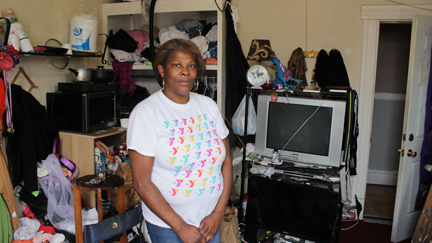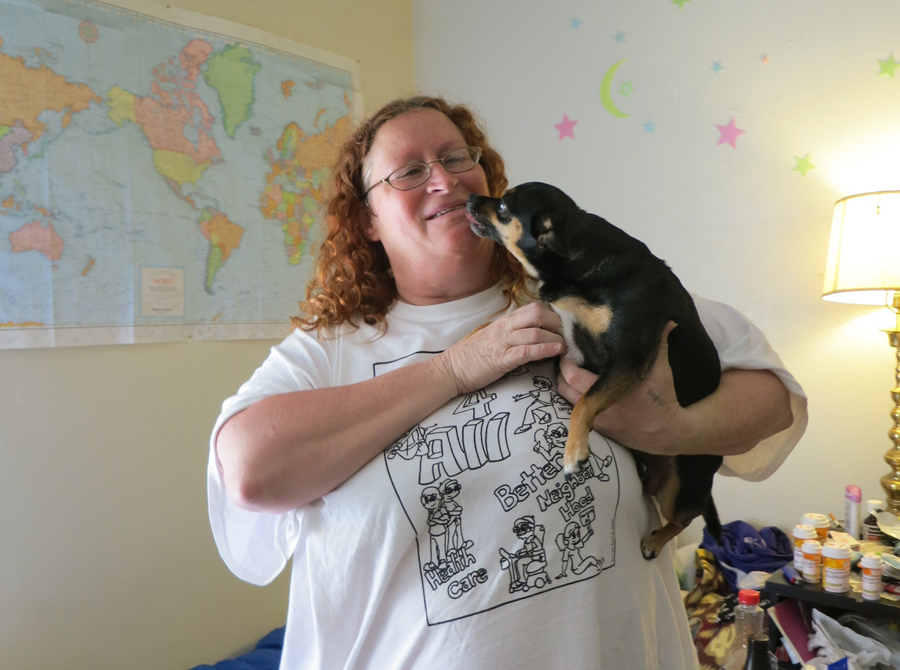
by TJ Johnston
Families living in 8-by-10-feet rooms. Drug dealing in the hallways. Vermin crawling in the rooms. Managers threatening tenants and visitors.
Such conditions in the single-room-occupancy (SRO) hotels that house upwards of 30,000 people in San Francisco scarcely make these abodes welcoming.
“Hardly Home: Stories from San Francisco’s SROs” is a short documentary directed by Samantha Lew, a student at the University of California at Berkeley and former intern at the Coalition on Homelessness. The film is based on Lew’s interviews with SRO residents, which were published in a series of stories in the Street Sheet last year.
The film has been released online with a report by the SRO Families United Collaborative to follow in March.
Estimates of the SRO hotel population in San Francisco appear to be fluid. In 2009, the city’s Planning Department said that 18,500 people dwell in hotels, while the Central City SRO Collaborative places the number at more than 30,000.
Housing of Last Resort
SROs often provide housing of last resort for low-income people and are meant to serve as a haven for families, people struggling with addiction and mental health diagnoses, domestic violence victims, immigrants and the elderly. That is the purpose of these hotels, at least in theory.
The reality is that SRO hotels, which average 30 to 40 rooms per building, are overcrowded, unsanitary and dangerous. In San Francisco, such hotels are concentrated in the Tenderloin, South of Market, Mission and Chinatown neighborhoods.
Although the city administers some hotels through nonprofit organizations, privately run SROs predominate. In 2009, the last year figures were available, the Department of Building Inspection found 418 private hotels, in contrast with 87 publicly operated ones.
Before filming, Lew, a San Francisco native studying public health at UC Berkeley, already had heard stories of couples and families living in cramped quarters, yet shooting her film in the hotels threw a new light on the SRO experience.
“Being in the space itself illustrated just how difficult it was to live in such a place,” she said. “I was also surprised by the variability between each SRO I visited. Some were nicer than others. Some had very different procedures to enter the buildings, and others seem like anyone could come and go.”
“There really is no uniformity between SROs, and each seemed to have its own culture and reputation,” Lew added.
One resident experienced a change in atmosphere from her previous hotel. Now living at the Mission Hotel, Cynthia’s lot in life somewhat improved when she moved from the Civic Center Hotel — with its open-air drug trade and use in the corridors and lack of separate-gender bathrooms — once the county welfare program offered her current room.
Her room at the Mission Hotel is adorned with a map of the world, a street sign reading “Dead Head Way” and a list of movies she wants to see. On her nightstand are framed certificates from the Mission SRO Collaborative and the San Francisco Board of Supervisors in recognition of her tenant advocacy. Maggie, her Chihuahua, lives with her to relieve symptoms of anxiety, post-traumatic disorder and depression. Occasionally, cockroaches crawl in her unit, but it hasn’t been infested with bedbugs, an all-too-common plague in SROs.
However, Cynthia notes the lack of a “housing ladder” when the city tries to secure or create living spaces for poor people. “I have no chance to move up when they build affordable housing,” she said. “They only want to move in homeless people. There should be a step-up program for one of those studio apartments they’re building, but I can’t because I’m not homeless any more.”

‘Worse Than Prison’
When Lew visited the Phillips Hotel in South of Market to interview Andrea, she and her crew experienced harassment and intimidation from the managers, Ashok and Ricky Patel, who tried to prevent their entry. Ricky Patel brandished a ridged, metal rod.
Lew had to call the police for assistance while Andrea was forced into an altercation with the Patels. Eventually, they were allowed to enter Andrea’s room.
Alexander Wong, Lew’s camera operator, noted the dangers tenants experience. “The hazards presented by SROs to the tenants’ mental and physical health are staggering and immediate,” he said.
The police are called in at least twice a week, Lew said. “The Patels constantly harass tenants, physically and psychologically, transforming the Phillips Hotel into what several of the tenants described as a prison.”
Psychological experts would even consider these tactics as a form of torture: loud noises and construction work at 3 or 4 a.m., constant berating with racial slurs and creation of health hazards.
Even the Patels’ ownership of the Phillips Hotel is in question. Tenants accuse them of fraudulently acquiring the hotel and pocketing rent money. Some have stopped paying.
Desiree, another Phillips resident who requested her face not be shown, had to be prescribed antidepressants. “It’s worse than prison,” she said. “At least in prison, they don’t treat you so bad.” When she reported the conditions to the city, the Patels retaliated by cranking up the heat and locking the bathrooms.
“He wants to strip you of your pride, your character and dignity,” she said of Ricky. “I told him you can’t have it.”
Families in Cramped Rooms
While the “S” in SRO stands for “single,” families are often housed in 8-by-10 or 10-by-12-feet spaces. This is definitely the case with Jun, a native of Guangzhou, China. He lives with his wife, Winnie, and their two children, now ages 10 and 1, in one of the 145 SRO hotels — about one-third the city’s total — that dot Chinatown.
Jun works as a janitor at Self Help for the Elderly, a community organization serving the Chinese community, while Winnie studies hairstyling. SROs act as entry points for newcomers to the country, yet the living arrangements add to the challenges immigrants already face.
“I thought it would be a little bit better [than in China], but I never thought it would be like this,” he said in Cantonese, noting the lack of amenities in each room. “Living here is a lot different from China. There’s no bathroom. There’s no kitchen. You have to wait in line in order to use the kitchen.”
His janitor’s wages can barely cover the $760 per month that pay for a 10-by-10-feet room furnished with a small metal sink, a couple of stovetops, a double bed and a bunk bed.
For now, moving to a space where Jun’s children would have more room to play isn’t an option, certainly when the average monthly rent for a two-bedroom in the city is approaching $4,000.
“Coming here, you expect the conditions to be better than in China. When you say the U.S. doesn’t have housing problems, that’s not true.”
********
Watch “Hardly Home: Stories From San Francisco’s SROs,” online at https://www.youtube.com/watch?v=PznBYNCdMY0
